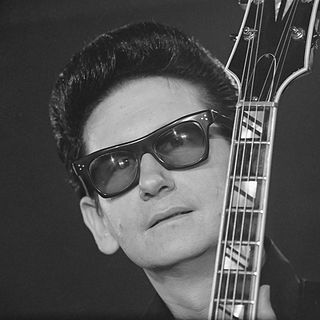
Roy Kelton Orbison was an American singer, songwriter, and musician known for his impassioned singing style, complex song structures, and dark, emotional ballads. His music was described by critics as operatic, earning him the nicknames "The Caruso of Rock" and "The Big O". Many of Orbison's songs conveyed vulnerability at a time when most male rock-and-roll performers chose to project machismo. He performed while standing motionless and wearing black clothes to match his dyed black hair and dark sunglasses.
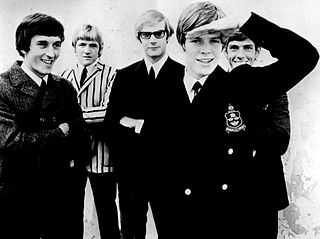
Herman's Hermits are an English rock and pop group formed in 1964 in Manchester and fronted by singer Peter Noone. Known for their jaunty beat sound and Noone's often tongue-in-cheek vocal style, the Hermits charted with numerous transatlantic hits in the UK and in America, where they ranked as one of the most successful acts in the Beatles-led British Invasion. Between March and August 1965 in the States, the group logged twenty-four consecutive weeks in the Top Ten of Billboard's Hot 100 with five singles, including the two number ones "Mrs. Brown You've Got a Lovely Daughter" and "I'm Henry VIII, I Am". Their other international Sixties hits include "I'm into Something Good", "Can't You Hear My Heartbeat", the two covers "Silhouettes" and "Wonderful World", "A Must to Avoid", "There's a Kind of Hush", "I Can Take or Leave Your Loving", "Something's Happening" and "My Sentimental Friend", all of which were produced by Mickie Most. They also appeared in four films, two of which were vehicles for the band.
Roy Orbison and Friends: A Black and White Night is a 1988 Cinemax television special originally broadcast on January 3, 1988, starring triple Hall of Fame inductee rock/pop singer/songwriter Roy Orbison and backing band TCB Band with special guests including Bruce Springsteen, k.d. lang and others. The special was filmed entirely in black and white. After the broadcast the concert was released on VHS and Laserdisc. A live album was released in 1989.

Mystery Girl is the twenty-second album by American singer Roy Orbison. It was his last album to be recorded during his lifetime, as he completed the album in November 1988, a month before his death at the age of 52, and it was released posthumously by Virgin Records on January 31, 1989. It includes the hit singles "You Got It", which was co-written by Orbison and his Traveling Wilburys bandmates Jeff Lynne and Tom Petty, and "She's a Mystery to Me", written by Bono and The Edge. The album was a critical and commercial success; it peaked at number 5 on the Billboard 200 in the United States, the highest position Orbison had achieved on that chart, and number 2 on the UK Albums Chart.
William Marvin Dees was an American musician known for his songwriting collaborations with singer Roy Orbison.
John Dee Loudermilk Jr. was an American singer and songwriter. Although he had his own recording career during the 1950s and 1960s, he was primarily known as a songwriter.
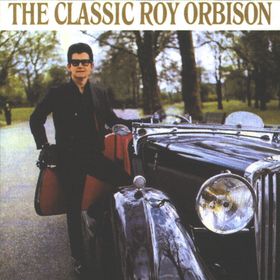
The Classic Roy Orbison is the ninth studio album recorded by Roy Orbison, and his third on the MGM Records label, released in July 1966. The single taken from it, "Twinkle Toes", would be Orbison's last US top-forty single during his lifetime, scraping in at #39. It also reached #24 in Australia and #29 in the UK.
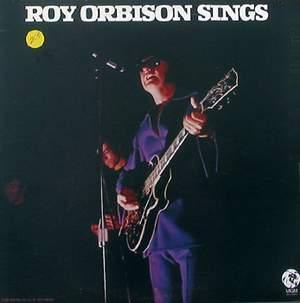
Roy Orbison Sings is the sixteenth album recorded by Roy Orbison and the ninth for MGM Records, released in May 1972. Around this time, Orbison's hit singles had well and truly dried up, but this album is said to be one of his finest.

The Orbison Way is the 8th album recorded by Roy Orbison, and his second for MGM Records, released in January 1966. Two singles were taken from the album — "Crawling Back" and "Breakin' Up Is Breakin' My Heart", both of which were chart hits in England, the US and Australia. The album charted at #11 in the UK and #128 in the US.

Roy Orbison Sings Don Gibson is a tribute album recorded by Roy Orbison for MGM Records, and his tenth studio album overall. Released in January 1967, it is a collection of songs written by Country Music Hall of Fame singer/songwriter Don Gibson who, like Orbison, often wrote about the loneliness and sorrow that love can bring. Its one single, "Too Soon to Know", became a smash hit in the UK, reaching #3 there in September 1966, and also reached no. 4 in Ireland and no. 27 in Australia. In Canada, the song only reached no. 71.
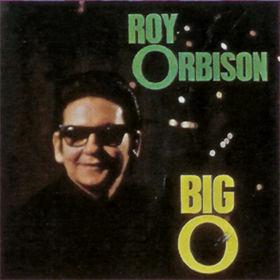
The Big O is the fifteenth music album recorded by Roy Orbison, and according to the authorised Roy Orbison biography, his second for London Records in the United Kingdom. The music and backing vocals were provided by English group, the Art Movement on all tracks except for "Penny Arcade", which was a studio recording and was released as a single in 1969, peaking at #27 in the UK and would be Orbison's last UK chart success during his lifetime. "Penny Arcade" was also his biggest hit in Australia, spending four weeks at Number One around Christmas, 1969. The second single, "Break My Mind", was Orbison's last Australian chart success during his lifetime, reaching #24 in March 1970. The album was released in Europe in early 1970.

The Great Songs of Roy Orbison is an album recorded by Roy Orbison for MGM Records that was released in the United States in February 1970.
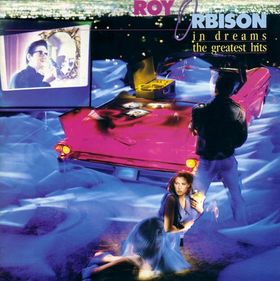
In Dreams: The Greatest Hits is a two-record album set by Roy Orbison songs released in 1987 on Virgin Records. It was produced by Orbison and Mike Utley, except for the song "In Dreams", produced by Orbison with T-Bone Burnett and film director David Lynch. All songs are re-recordings by Orbison from 1986, except "In Dreams" from April 1987.
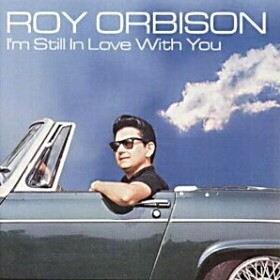
I'm Still in Love With You is the nineteenth album by Roy Orbison, recorded for Mercury Records and according to the authorised biography of Roy Orbison, it was released in September 1975.

"In Dreams" is a song composed and sung by singer Roy Orbison. An operatic rock ballad of lost love, it was released as a single on Monument Records in February 1963. It became the title track on the album In Dreams, released in July of the same year. The song has a unique structure in seven musical movements in which Orbison sings through two octaves, beyond the range of most rock and roll singers.
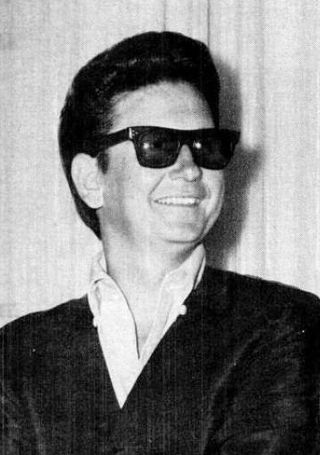
Roy Orbison was an American singer-songwriter who found the most success in the early rock and roll era from 1956 to 1964. He later enjoyed a resurgence in the late 1980s with chart success as a member of the Traveling Wilburys and with his Mystery Girl album, which included the posthumous hit single "You Got It". At the height of his popularity, 22 of Orbison's songs placed on the US Billboard Top 40 chart, and six peaked in the top five, including two number-one hits. In the UK, Orbison scored ten top-10 hits between 1960 and 1966, including three number-one singles.

A Black & White Night Live is a Roy Orbison music album made posthumously by Virgin Records from the HBO television special, Roy Orbison and Friends: A Black and White Night, which was filmed in 1987 and broadcast in 1988. According to the authorised Roy Orbison biography, the album was released in October 1989 and included the song "Blue Bayou" which because of time constraints had been deleted from the televised broadcast. However, it did not include the songs "Claudette" and "Blue Angel", which were also cut from the original broadcast for the same reason.

"Oh, Pretty Woman" or simply "Pretty Woman" is a song recorded by Roy Orbison, written by Orbison and Bill Dees. It was released as a single in August 1964 on Monument Records and spent three weeks at number one on the Billboard Hot 100 from September 26, 1964, the second and final single by Orbison to top the US charts. It was also Orbison's third single to top the UK Singles Chart.
"You Win Again" is a 1952 song by Hank Williams. In style, the song is a blues ballad and deals with the singer's despair with his partner. The song has been widely covered, including versions by Ray Charles, Jerry Lee Lewis, Roy Orbison, the Grateful Dead, Charley Pride, Bob Dylan, and the Rolling Stones.
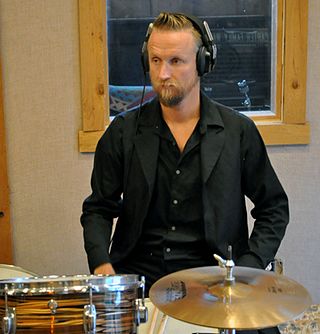
Alexander Orbison, also known as Orbi, is an American drummer, writer, director, and film producer. He is the president of Still Working Music Group, a publishing company. He is also president and co-founder of Roy's Boys LLC, which manages the legacy of his father, musician Roy Orbison; the organization also includes his brothers, Roy Orbison Jr. and Wesley Orbison.
















